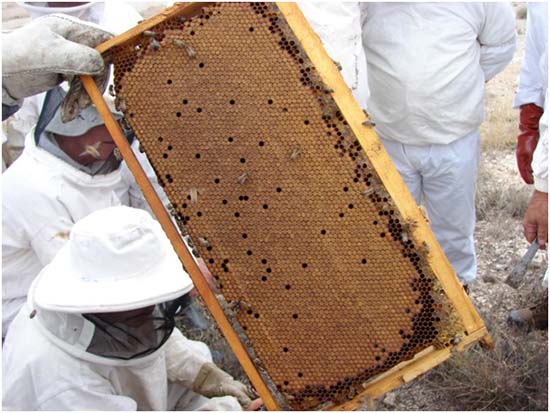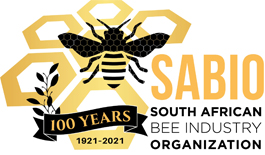Legislation
 Legislation – affecting Beekeeping in South Africa
Legislation – affecting Beekeeping in South Africa
A variety of pieces of legislation affect beekeeping in South Africa and these have been promulgated over a number of decades.
Some aspects have become dated and SABIO has been involved with the Department of Agriculture, Land Reform and Rural Development to review and redraft key aspects of the legislation to promote and protect the beekeeping industry in the country.
Vandalism of beehives is a constant menace for the South African Beekeeper. Unfortunately the Agricultural Pests Act makes no provision for this sort of pestilence!
The main pieces of legislation impacting on the beekeeping industry are as follows:
Beekeeping Legislation
Agricultural Pests Act (36/1983): In respect of beekeeping the Act focuses on restrictions on the importation of beehive products such as honey and beeswax and used apiary equipment and provides for the requirement of import permits for such goods. It also makes provision for the promulgation of Control Measures for disease control and prevention and for penalties for non-compliance in respect of these measures.
Control Measure GN R858 15 November 2013 – Control Measure relating to Honeybees promulgated in terms of the Agricultural Pests Act, as amended GN R1511 22 November 2019. This Control Measure has replaced the Control Measure R1674 promulgated in December 1998 which required registration of beekeepers through SABIE, the predecessor to SABIO, and focused on measures to eradicate the Capensis infestation on Scutellata colonies.
This new piece of legislation now makes it obligatory for all beekeepers to register through DALRRD (not SABIO) on an annual basis, to keep proper records of their beekeeping activities, to mark their beehives and to manage their colonies in a responsible manner to prevent and control bee diseases.
In addition to controlling Capensis in Scutellata colonies it also includes the obligation on beekeepers to manage or eradicate the devastating American Foul Brood which has now been declared a notifiable disease. The Control Measure also requires all persons who carry out Bee Removal Services to likewise register with the Department of Agriculture on an annual basis, similar to beekeepers.

A. m. scutellata (African Bee) Brood frame from a prolific laying Queen. This colony survived a capensis invasion and fully recovered having been placed in a quarantine area.
Grading, Packing & Marking of Honey Products
In terms of the Agricultural Product Standards Act (119/1990) a set of Regulations relating to the Grading, Packing and Marking of Honey and Mixture of Bee Products Intended for Sale in the Republic of South Africa, Regulation 835 of 2000, sets out the standards required for all bee products in South Africa, including in particular liquid honey, creamed honey, comb honey and chunk honey.
It defines two Grades, Choice Grade and Industrial Grade for liquid honey, creamed honey and comb honey, and only Choice Grade for chunk honey and a mixture of bee products. It sets out the tests required for determining the standards for the composition, quality and ripeness of honey. It also sets out the requirements for the labelling of honey for the consumer market.
In terms of Regulation R146 dated the 1 March 2010 under the Foodstuffs, Cosmetics and Disinfectants Act, 1972 (Act 54 of 1972), Regulations Relating to the Labelling and Advertising of Foodstuffs, statutory requirements have been prescribed in respect of labelling and marketing of foods. Honey is mentioned in these Regulations.
The main requirement of these Regulations states that no person shall manufacture, import, sell or offer any pre-packaged foodstuff for sale unless the food container is labelled in accordance with these Regulations.
Whereas most foodstuff labelling requires the date of durability to be stated on the label using the terms “best before”, “use by” or “sell by”, honey is exempt from this requirement. The Regulations prohibit the use of false, negative or misleading descriptions on the labelling and prescribe what may or may not be used.
Food Quality and Importation Requirements
The Foodstuffs, Cosmetics and Disinfectants Act, 1972 (Act 54 of 1972), makes provision for the control over the safety and quality aspects of the sale, manufacture and importation of foodstuffs, as well as of aspects such as labelling.
It prohibits the sale or importation of any foodstuff, including honey, which does not comply with the provisions of the Act. The Act also provides for the irradiation requirements of certain food products, which include honey, and labelling requirements on food products subjected to irradiation measures to ensure consumers are not misled and can make informed choices.
The Directorate: Plant Health and Quality of the Department of Agriculture, Land Reform and Rural Development (DALRRD) is responsible for laying down specific phyto-sanitary requirements for certain products which includes imported honey which needs to be irradiated to prevent the dissemination of the pathogen Bacillus larvae, which causes American Foul Brood.
Any person wishing to import honey into South Africa must first and foremost comply with section 3 (1) of the Agricultural Pests Act, 1983 (36/1983) for a Permit for the Importation of Controlled Goods from DALRRD subject to conditions laid down by the authority.
The importer must produce this permit signed by DALRRD before the Department of Health may proceed with processing of the application for irradiation of the imported honey.
(Given the number and volume of Regulations and the size of the Foodstuffs, Cosmetics and Disinfectants Act itself, most of which does not directly apply to honey and beekeeping the statutory laws are not downloaded here.)
Honey Production and Extraction
This would affect premises where honey is extracted – (Extraction Facilities) to ensure hygienic standards are maintained and foodstuffs are not contaminated.
Biodiversity and Bee Forage
The Conservation of Agricultural Resources Act, 1983 (Act 43 of 1983) (CARA) falls under the Department of Agriculture. It was promulgated to ensure the long term protection and sustainable use of natural agricultural resources.
Part of its purpose is to ensure the prevention of the erosion and weakening of the country’s water sources, the protection of natural vegetation and the combating of weeds and invader plants.
In terms of its Regulations 6 species of eucalypts have been designated as Category 2 Invader Plants with a potential to become invasive and which may be managed within certain demarcated areas given acknowledgement of certain beneficial properties. Those occurring outside demarcated areas have to be controlled. The six species are:
Eucalyptus camaldulensis – Red River Gum
Eucalyptus cladocalyx – Sugar Gum
Eucalyptus diversicolor – Karri
Eucalyptus grandis – Saligna Gum or Rose Gum
Eucalyptus paniculata – Grey Ironbark
Eucalyptus sideroxylon – Black Ironbark and Red Ironbark
Eucalyptus lehmannil – Spider Gum is considered a Category 1 invasive species in the Western Cape and Category 2 species in the rest of South Africa.
The National Environmental Management of Biodiversity Act, 2004 (Act No 10 of 2004), (NEMBA) falls under the Ministry of Water and Environmental Affairs.
Its purpose inter alia is to provide for the management and conservation of the country’s biodiversity and for the protection of species and ecosystems. It makes provision for alien and invasive species to be designated for which a permit is required for a person to carry out a “restricted activity”.
In respect of alien or listed invasive species this does not include chopping down or destroying such species. Eucalypts are not included in the regulatory list of alien or invasive species in the NEMBA Regulations.
Unfortunately this creates some confusion as the one Act falling under one Ministry does not support the other falling under another Ministry. It is hoped that this discrepancy will soon be resolved.
Municipal By-laws
In some of the larger metropoles Municipal By-Laws falling under the Health Departments have promulgated specific by-laws regarding the keeping of bees in urban or the municipal areas. Those South African cities which have these bylaws are:
- City of Johannesburg By-law on the Keeping of Bees
- City of Tshwane (Pretoria) Metropolitan Municipality By-Law on the Keeping of Bees
- Free State Provincial Regulations for the Keeping of Bees, Municipal Areas
- Cities of Cape Town, Durban and Port Elizabeth – it appears that there are no specific municipal by-laws on the Keeping of Bees in the metropolitan areas of these urban areas.

